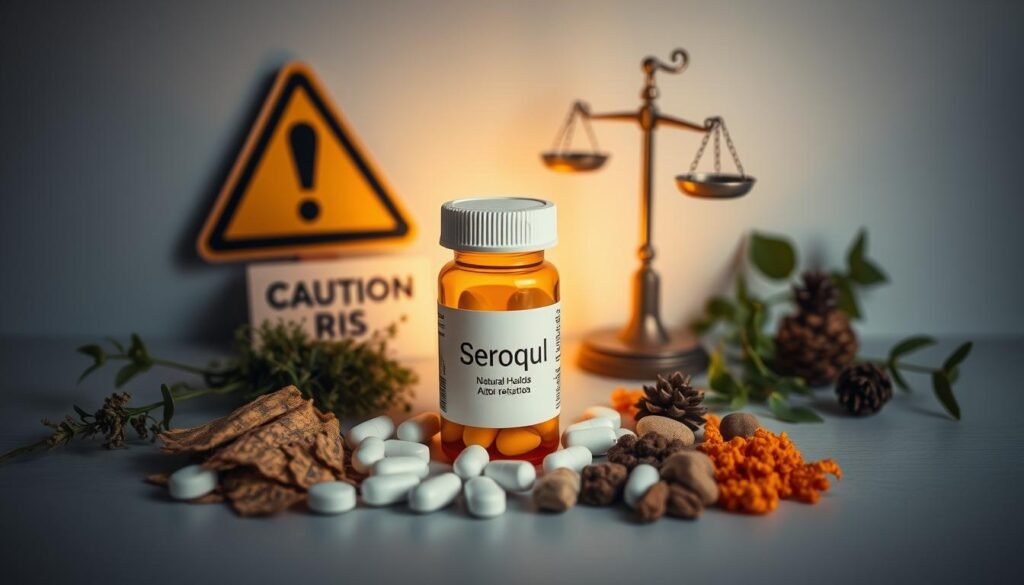Did you know over 40 million adults in the US have anxiety disorders? This makes it a top mental health issue. Seroquel, a known medication in tablet form, is catching attention for its help in managing anxiety.
It was first approved for schizophrenia and bipolar disorder episodes. Yet, Seroquel seems effective against anxiety symptoms in disorders like generalized anxiety, OCD, PTSD, and social anxiety. This guide talks about how Seroquel can help with anxiety, its benefits, and what you should know.
Key Takeaways
- Seroquel is mainly for schizophrenia and bipolar but also treats anxiety off-label.
- Quetiapine fumarate can significantly reduce anxiety symptoms in many cases.
- The medication comes in various dosages for personalized treatment plans.
- Despite lacking FDA approval specifically for anxiety, research backs its effectiveness.
- Possible side effects exist and should be watched closely by patients.
- Knowing how Seroquel works can help determine if it’s right for managing anxiety.
Understanding Seroquel and Its Mechanism of Action
Seroquel is an atypical antipsychotic medicine. It is used to help with mental health issues like schizophrenia and bipolar disorder. It comes in doses from 25 mg to 400 mg and you take it by mouth. Seroquel helps control moods and eases anxiety through its action on the brain’s chemistry.
What is Seroquel?
Seroquel is not like older antipsychotics. It works by adjusting the levels of serotonin and dopamine in the brain. By doing this, it can make moods better, reduce anxiety, and improve mental health. It’s a key medicine for treating several mental health conditions.
How does Quetiapine Work in the Brain?
Quetiapine, the drug in Seroquel, targets specific brain receptors. It blocks certain serotonin and dopamine receptors. This helps lessen symptoms of schizophrenia and mood disorders. It adjusts brain chemicals to balance emotions and reduce anxiety. Seroquel has shown to be very effective, especially for those with generalized anxiety disorder (GAD).
| Aspect | Seroquel | Traditional Antipsychotics |
|---|---|---|
| Type | Atypical Antipsychotic | Typical Antipsychotic |
| Receptor Targets | 5-HT2A, D2 | D2 |
| Side Effects | Lower incidence of extrapyramidal symptoms | Higher incidence of extrapyramidal symptoms |
| Usage | Schizophrenia, Bipolar Disorder, GAD | Schizophrenia, Acute Psychosis |
Approved Uses of Seroquel
Seroquel, also known as quetiapine, is an atypical antipsychotic. It’s approved by the FDA for various mental health issues. The main Seroquel uses are for treating schizophrenia and bipolar disorder. This medication helps manage the tough symptoms tied to these disorders.
Seroquel for Schizophrenia
Seroquel is often prescribed to those with schizophrenia. Clinical trials have shown it’s effective in lowering both positive and negative symptoms. It also helps with cognitive, anxious-depressive, and aggressive symptoms. This makes Seroquel a key part of treatment plans.
Seroquel for Bipolar Disorder
In bipolar disorder treatment, Seroquel plays a vital role. It’s used for manic episodes in adults and kids aged ten and up. It also helps with depressive episodes in both bipolar I and II disorders. It leads to fewer severe relapses than placebo treatments. This makes Seroquel important for managing mood disorders.
Seroquel for other mental health conditions
Seroquel is also explored for other mental health issues. It’s sometimes used off-label for generalized anxiety disorder. This is especially when SSRIs don’t work. When prescribed carefully, Seroquel can help people with complex mental health needs.
Seroquel For Anxiety: Is It Effective?
Seroquel is getting noticed for treating anxiety off-label. It’s especially looked at for generalized anxiety disorder. Many find Seroquel’s active part, quetiapine, helps lessen anxiety symptoms.
Off-Label Use in Anxiety Disorders
Despite no FDA approval for anxiety, Seroquel is gaining popularity. A key study with 2,248 adults showed quetiapine lessens anxiety symptoms. It proved more effective than a placebo.
Evidence Supporting Seroquel’s Effectiveness in Anxiety
Quetiapine works as well as SSRIs for anxiety. At week 8, its users and those on paroxetine had higher remission rates than placebo users. Plus, quetiapine XR users reported less sexual dysfunction, making it an appealing choice.
Yet, it’s important to be aware of the risks. Users might face constipation, tiredness, and dry mouth. More serious issues include the risk of suicidal thoughts and movement disorders. A good understanding of Seroquel’s role in treating anxiety is vital for patients and doctors alike.
| Study Group | Remission Rates (%) | Overall Discontinuation Rate (%) | Sexual Dysfunction (%) |
|---|---|---|---|
| Quetiapine XR (150 mg) | 42.6 | Comparable to SSRIs | 1.8 |
| Paroxetine (20 mg) | 38.8 | Higher than placebo | 7.4 |
| Placebo | 27.2 | Higher than quetiapine | 2.3 |
Benefits of Using Seroquel for Anxiety Management
Seroquel is also known as quetiapine. It has many benefits for people with anxiety. These conditions come with hard symptoms. So, the role of Seroquel in controlling anxiety is really important.
Reduction in Anxiety Symptoms
Reducing anxiety symptoms is a key benefit of Seroquel. Research shows it can lessen worry, restlessness, and panic. A 2016 study with 2,248 people showed Seroquel helps maintain emotional balance in those with generalized anxiety disorder. It’s helpful when usual treatments don’t work.
Improvement in Sleep Quality
Improving sleep quality is another big help from Seroquel. People with anxiety-driven insomnia get better sleep with it. Good sleep is essential for emotional health. Seroquel aids in coping with anxiety by enhancing sleep. Its extended-release form ensures medication release all night.

How Seroquel Compares to Other Anti-Anxiety Medications
Understanding Seroquel and other medications helps people make smart choices about anxiety treatment. The discussion on Seroquel vs anxiolytics matters for those looking into anti-anxiety meds. Seroquel, unlike traditional anxiolytics, treats more than just schizophrenia and bipolar disorder. It also helps with anxiety disorders.
Difference Between Seroquel and Traditional Anxiolytics
Traditional anxiolytics, like benzodiazepines, can cause dependency and withdrawal issues. Seroquel offers a safer option for long-term anxiety treatment. Unlike common benzodiazepines such as Xanax, Seroquel can manage anxiety over time without the high risk of addiction.
Benefits Over SSRIs and SNRIs
Choosing between SSRIs, SNRIs, and Seroquel can be tough for patients. While SSRIs and SNRIs are usually the first choice, some find Seroquel more effective. This is especially true when the usual medications don’t work. Seroquel’s flexibility makes it a backup for when other treatments fail.
Dosage and Administration of Seroquel
The proper use of Seroquel depends on correct Seroquel dosage guidelines. These guidelines are unique to each person. Knowing how to start and adjust doses is key for the best treatment results.
Typical Dosage Guidelines
For adults with schizophrenia, the usual starting dosage is 150 mg to 750 mg daily. The maintenance dosage often ranges from 400 mg to 800 mg per day. When treating manic episodes of bipolar disorder, 400 mg to 800 mg per day is typical.
This amount is ideally split into two doses. For depressive episodes in bipolar disorder, a 300 mg maintenance dose is common.
Teens aged 13–17 with schizophrenia may take 400 mg to 800 mg daily. This is also split into two doses. For those aged 10 to 17 with bipolar disorder, the dosage is 400 mg to 600 mg daily. These doses are tailored to meet their specific needs. It’s crucial to monitor the administration of Seroquel closely. This is due to possible drug interactions and different health conditions.
Adjustments for Different Ages and Conditions
Adjusting treatment for age is important, especially for older adults or those with liver issues. These patients may need lower starting doses.
Healthcare professionals should conduct regular check-ups. This ensures the treatment works well and is safe.

Doctors may ask for regular blood and urine tests during treatment. These tests check for side effects like high blood sugar or changes in blood cells. Understanding and managing dosages improves the safety and effect of Seroquel.
| Condition | Typical Starting Dose | Maintenance Dose |
|---|---|---|
| Schizophrenia (Adults) | 150-750 mg/day | 400-800 mg/day |
| Bipolar Disorder (Manic Episodes) | 400-800 mg/day | 400-800 mg/day |
| Bipolar Disorder (Depressive Episodes) | N/A | 300 mg/day |
| Schizophrenia (Ages 13-17) | 400-800 mg/day | 400-800 mg/day |
| Bipolar Disorder (Ages 10-17) | 400-600 mg/day | Up to 600 mg/day |
For more info on Seroquel dosage guidelines, talking to healthcare providers is key.
Potential Side Effects of Seroquel
Knowing about Seroquel’s side effects is key for those using it. It’s important for patients and caregivers to understand both minor and major risks. This helps keep patients safe and healthy during treatment.
Common Side Effects
Seroquel can cause various common side effects. These may affect a person’s daily activities. It’s best to talk to doctors if these happen. Common issues include:
- Drowsiness or sleepiness during the day
- Dry mouth
- Weight gain or changes in appetite
- Dizziness and headaches
- Constipation
- Swollen breasts and irregular periods
- Fast heartbeat
Though annoying, these occur in many people taking Seroquel.
Serious Side Effects to Watch For
Rare but critical side effects may happen too. These require quick action. Being aware and responsive is vital. Severe issues include:
- Twitching or involuntary jerking movements
- Signs of neuroleptic malignant syndrome, such as high fever and muscle stiffness
- Symptoms indicating a stroke, like sudden weakness on one side
- Chest pain or difficulty breathing
- Prolonged painful erections (priapism)
- Severe allergic reactions manifesting as facial swelling or difficulty breathing
- Increased risk of death in elderly patients with dementia-related psychosis
If you notice any severe side effects, get help immediately. Always communicate with your healthcare team about your concerns.
| Common Adverse Effects | Serious Side Effects |
|---|---|
| Drowsiness | Twitching or jerking movements |
| Dry mouth | Symptoms of neuroleptic malignant syndrome |
| Weight gain | Signs of stroke |
| Dizziness | Chest pain or difficulty breathing |
| Constipation | Prolonged painful erections |
| Fast heartbeat | Severe allergic reactions |
Precautions and Considerations When Using Seroquel
Taking Seroquel needs careful thinking. This is especially true about its precautions and drug interactions. Knowing the interactions and keeping an eye on health is key to safe and effective use.
Drug Interactions
Seroquel, or its generic name quetiapine, can interact with many meds. These include drugs for the central nervous system (CNS), which may increase sleepiness. It’s crucial to tell your doctor about all drugs you’re taking. Important interactions to note are:
- Blood pressure medications
- Benzodiazepines
- Opioids
- Anticholinergics
- Antibiotics and antifungals
- HIV drugs
- Seizure medications
- Rifampin
Certain supplements like St. John’s wort might make it less effective. Although alcohol doesn’t directly interact with Seroquel, it can increase side effects and worsen symptoms.
Monitoring Blood Work and Health Conditions
It’s crucial to regularly monitor your health while using Seroquel. Doctors often recommend blood tests to check metabolic changes like cholesterol and sugar levels. This is important for people with conditions such as:
- Liver impairment
- Cardiovascular issues
Keeping an eye on health concerns helps avoid complications. This ensures a safer and more beneficial treatment for Seroquel users.

Personal Experiences and Case Studies on Seroquel
Real users have shared how Seroquel has helped them manage their anxiety. Their stories highlight the drug’s ability to change lives. It does this by reducing anxiety symptoms and improving life quality.
User Testimonials on Anxiety Relief
Many have seen their anxiety levels drop after using Seroquel. They tell of feeling more normal and being able to do daily tasks better.
- Improved sleep patterns
- Reduced feelings of irritability
- Enhanced capacity to handle stressful situations
Clinical Outcomes from Recent Studies
Recent studies support these personal stories, showing Seroquel’s effectiveness. Research shows Seroquel can significantly lower anxiety symptoms, which matches user experiences.
| Study Focus | Findings |
|---|---|
| Effects on Anxiety | Significant symptom relief noted in 60-70% of participants |
| Sleep Improvement | Extended sleep duration observed in several studies |
| Functional Outcomes | Improved daily living skills and mood stabilization |
Looking at personal stories and research, Seroquel plays a big role in fighting anxiety. The fact that users’ experiences and studies agree shows Seroquel is important in mental health care.
Conclusion
Seroquel, known as quetiapine, is emerging as an effective choice for anxiety, especially Generalized Anxiety Disorder (GAD). Research shows it can greatly improve anxiety symptoms. It performs on par with traditional SSRIs, as stated in a recent study. This study showed patients on quetiapine improved more than those on a placebo.
Yet, it’s important to be aware of possible side effects like weight gain and feeling very sleepy. These underline the need for a treatment plan that’s right for each person. Quetiapine’s ability to make people sleepy might help those with GAD who find it hard to sleep. It can tackle several aspects of anxiety at once.
Quetiapine looks promising for managing anxiety, but more studies are needed. Anyone thinking about using Seroquel for anxiety should talk to their doctor. They can create a care plan that balances benefits and risks. For more on Seroquel and anxiety, check out this detailed review.